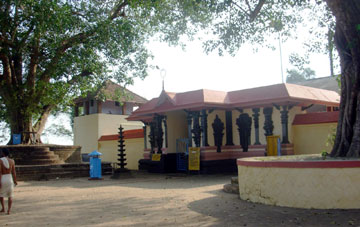Thirunavai Sri Navaimukunthan Temple, Kerala

Deity: Navamukunda perumal, Amman: Malarmangai Nachiyar Temple Address: Sri Navaimukunthan Temple, Thirunavai - 676 301 Malappuram District, State of Kerala Phone: 0494 260 3747 District: Malappuram Open between: 06:00 AM to 12:00 PM and 04:00 AM to 08:30 AM
Introduction
- Location: Tirunavaya Temple (Tirunavaya Navamukunda Temple) is located in central Kerala, India, on the northern bank of Bharatappuzha (River Ponnani).
- Deity: Dedicated to Navamukundan (a form of Vishnu), worshiped as Navamukunda Perumal.
- Glorification: The temple is glorified in the Divya Prabandha, a collection of hymns by Tamil Vaishnava Alvars. It is one of the 108 Divya Desams.
- Rituals: The temple has no pond or well; instead, water from the Bharatappuzha River is used for rituals. It is considered a Trimurti sangama due to the presence of nearby Brahma and Shiva temples across the river.
- Associated Deities: Ganapati (Adi Ganesa), Lakshmi (Malarmangai Nachiyar), and Ayyappa Swami are also worshipped.
- Lakshmi has a separate shrine, unlike many other Vishnu-Lakshmi temples.
- Puranic Significance:
- The temple hosted the Mamankams, a festival celebrated every 12 years.
- Destroyed by Tipu Sultan in the 18th century and again during the 1921 Mappila Rebellion.
- The temple is dedicated to Navamukunda Perumal, with a legend that the first eight idols sank into the earth, and the ninth idol sank to its knees before being stopped.
- Navayogis: Nine yogis installed the idols, and the site is known as Navayogisthala.
- Gajendra and Lakshmi worshiped Vishnu here with lotus flowers from a nearby lake.
- Beliefs:
- Similar to Kashi, many people come to Ithalam (Tirunavaya) to honor their ancestors and perform Pitru Darbhanam (ancestral rites).
- Devotees get married to Perumal and dress up to worship him.
- Special Features:
- The temple follows Kerala Temple Architecture, with a rectangular structure surrounding the sanctum.
- Kshetra-matilluka (rectangular outer wall), dvaja sthambha (metal-plated flag-post), and dipasthambha (light post) are notable features.
- The temple includes a Chuttuambalam (outer pavilion), nalambalam (pillared halls and corridors), and namaskara mandapa (raised platform).
- Thevrapura: The kitchen for preparing offerings.
- Balithara: An altar for ritual offerings to demi-gods and deities.
- The Sri Kovil houses the idol of Navamukunda Perumal, and only the main priests (tantri and melsanti) can enter the sanctum.
- The central temple has a square plan, built with granite and laterite, with a terracotta tile roof supported by a wooden structure.
- The roof is designed to protect the structure from monsoon rains.
- Wood and stucco carvings depict stories from the Ramayana and Mahabharata.
- Lamps are placed around the sanctum and lit during festivals.
- Festivals:
- Vaikunda Ekadasi
- Thiruvonam
Century/Period/Age
1000-2000 years old
Saints and Singers
Thirumangaiyalwar two, Periyarvar eleven. So, thirteen verses.
Managed By
Travancore Devasthanam Board
Best Time
கோயில் திறந்திருக்கும் நேரம் : 05.00 11.00 மற்றும் 17.00 19.30
Accommodation
Thirunavai
Nearest Bus Station
Thirunavai
Nearest Railway Station
Mallapuram
Nearest Airport
Calicut









